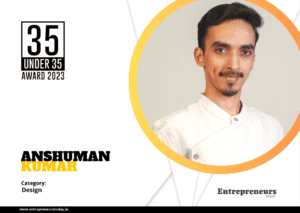
What are the core principles that a designer should be mindful of?
According to Anshuman, critical design starts with framing the right questions, such as how design can humanize our relationship with technology, how designers can use materials to avoid creating a society of waste, and how they can design with people to empower them. Finally, one needs to ask how to design for the future in order to build resilience.
“If a designer is mindful of these core principles and the kind of culture they are building around the creation of anything, then they have the power to shape values and determine the future of humanity and even beyond earth,” shares Anshuman Kumar.
Entrepreneurs Today got in touch with the talented product designer for an email interview to better understand his journey so far.
A product designer from Ranchi, India, Anshuman Kumar has worked in the industry for almost ten years. Not only that, but he has also spoken at TEDx events and received the renowned Red Dot Award, known as the Oscar in the design world. He has designed a wide range of products for various multinational corporations, including Decathlon, Jindal, and TATA group, encompassing wearable technology, home appliances, sports equipment, and lifestyle decor. Collectively over 25 of his designs have been successfully entered the international, Korean, and Indian markets.
Anshuman is currently employed as a Lead Designer at Samsung R&D, Bangalore where he has been instrumental in developing state-of-the-art AI-based products and services in the voice experiences, Metaverse, Wearables, and Intelligent Phygital Product domains.
Anshuman graduated with a Master’s in Industrial Design from Ahmedabad’s renowned National Institute of Design (NID), one of the “Institute of National Importance.” He received two gold prizes from NIFT Bangalore for his graduate studies in lifestyle accessory design.
What are the key inspirations behind Anshuman’s unique designs?
What makes his designs unique is his ability to draw inspiration from nature and incorporate it into his concepts, as well as his use of new technologies to create functional and simplistic designs. He also mentions the influence of the Japanese aesthetic concept of “Kanso,” which emphasizes simplicity and the elimination of unnecessary elements in a design. Therefore, Anshuman’s designs are distinguished by their natural inspirations, technological sophistication, and adherence to a minimalist philosophy.
“Nature is my all-time favorite subject to observe, study, and learn from, as it provides me with mysterious inspirations. I believe and have observed that inspiration from nature has the potential to be molded into novel concepts. Many of the best innovations are the result of nature studies or biomimicry. Therefore, I believe that mother nature is one of the biggest influencers on me as a designer. Additionally, new technologies that emerge across various domains always give me food for thought on how to amalgamate functional sophistication and the simplicity of human interactions to create forms that pique cognitive and tactile senses,” Anshuman further reveals.
What inspired Anshuman to pursue a career in product design, and how did he develop his skills and gain recognition in the field?
Anshuman’s first memories of playing in his grandfather’s electronics factory inspired him to pursue a career in product design. His father, a mechanical engineer, encouraged him to inquire and investigate, which further stoked his interest in how things function. But because he was uninterested in math, he performed poorly on his board exams, which prevented him from enrolling in conventional engineering colleges.
After facing this setback, Anshuman had time to consider his genuine interests, which finally inspired him to study design. He enrolled at NIFT, where he was recognized for his work and eventually took first place in all of India. Then he was given a scholarship to study in Italy, but he chose to begin his career with Decathlon in India instead, where he gained practical experience in bringing concepts to market.
Despite his success, Anshuman was driven by a desire to learn and decided to pursue a master’s degree at NID, Ahmedabad, where he was guided by designers who helped him rewire his thinking and view things from a systemic level. The program was also set up by the Indian government under the supervision of Charles & Ray Eames in the 60s. As a result of his exposure, he received numerous national and international awards, such as the coveted Red Dot awards, and he was given the chance to present a research paper on social innovation at design symposiums in Italy and India. He has also exhibited his designs in museums in Singapore and China.
Anshuman adds, “I didn’t stop there, after graduation I received a 100% scholarship from Richemont group based in Italy which holds a few of the most luxurious brands in the world like the legendary Cartier, Mont Blanc, Panerai, Dunhill, and IWC to name a few. I wasn’t able to pursue it since the high cost of living abroad made me go back to start my design career in India with Decathlon. This gave me real-world experience in bringing a concept to market. Looking at the impact everyday products left on consumers’ life bringing happiness can’t be equated with any other feeling.”
A Glimpse at Anshuman’s Remarkable Achievements
Anshuman has achieved a number of accomplishments in various fields including design, research, and innovation. Some of his major achievements are that his product design was showcased in the Red Dot Design Museum in Singapore for over a year, representing India as an exhibit. He also received the Red Dot “Best of the Best” award in Singapore in 2021 for his design concept project, Mollie – The Most Elegant yet Fun Salt & Pepper Shaker. Additionally, he was a three-time finalist in various categories at the Lexus Design Award, won the Samsung C-Lab Intrapreneurship Program in 2019, and presented his research paper on Social Innovation at RSD 7 – Systemic Design Symposium Turin Italy, which was published in open research at OCAD University, Toronto in 2018. He was also awarded the “Upcoming Designer” under 25 years by Tata Motors and Campus Diaries at the Tata GenX NANO 25 Under 25 in 2016, received a 100% scholarship for the Creative Academy in Milan, Italy in 2013, won 2 gold medals for the TATA Elxsi Best Project Award and convocation awards at NIFT in 2013.
Peering into Anshuman’s Future Self a Few Years From Now
His plans for the future involve using his design skills to contribute to creating a more sustainable, ethical, and inclusive world. He believes that designers have a critical role to play in solving complex global issues such as global warming and socio-economic problems. Anshuman wants to embrace circular design methods and systemic design tools to create products & experiences that are sustainable, regenerative, and efficient. He intends to move away from the linear economic model of take, make, consume, and dispose of by promoting recycling, extending product life cycles, using renewable resources, and supporting rental services.
Anshuman’s thoughts on the emergence of AI engines:
“Artists and average designers are going to find a hard time to pitch about their skill-based value as we see a rise in evolving AI engines like Chat GPT, Dalle or Mid journey, creating diverse sets of content which somewhat could be limiting for a human brain to think or create while dealing with their mental blocks. But I believe that we humans are intelligent enough to embrace and evolve over these AI engines side by side. Instead of getting intimidated one should look at them as just mere tools and amalgamate the best of human and machine intelligence. Incorporate these tools in their design methods to speed up the process and earn bandwidth to think more about the vision and seek answers to the right questions.”







